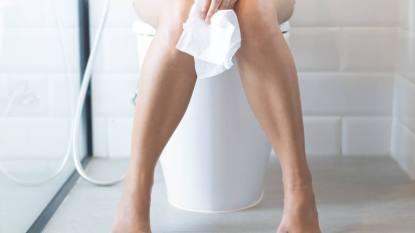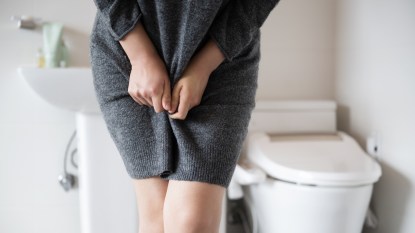3 Private Health Questions Answered by a Doctor
Expert answers to your most intimate health questions.

During a doctor’s visit, you may get a little hesitant to ask questions relating to your private health. But, it’s still important to get those answers in order to stay healthy and feel comfortable. We spoke to gynecologist Barbara DePree, MD, to answer three questions relating to menstrual cramps, menopause, and night sweats.
Q: My doctor recommended I take ibuprofen when my menstrual cramps start, but it doesn’t help. I mentioned it to a friend, who said her allergy medication stopped her cramps. Should I try it? I’m allergic to ragweed, but I’ve never taken medication for it.
A: I don’t advise it. The generic form of Singulair (montelukast) is a prescription anti-inflammatory drug used to treat asthma and allergies, and it may, as your friend discovered, relieve menstrual cramps. Some women taking the medication made the surprising connection only after they stopped taking the medicine. And studies showed the drug to be as effective as nonsteroidal anti-inflammatory medications for menstrual cramps. But in 2020, the Food and Drug Administration issued a warning advising against prescribing the drug for mild allergy symptoms such as yours due to the increased potential risk of serious mental health side effects like suicidal thoughts. For this reason, I advise against it, as the risks out-weigh the benefits.
Your doctor suggested ibuprofen because it inhibits the production of prostaglandins (an inflammatory, hormone-like chemical that triggers the uterus to shed its lining and can increase sensitivity to pain). The medication is usually highly effective at easing cramps. But a tip I share with my patients: Instead of waiting until the onset of your period to take it, start a few days before your period with 800 mg. every eight hours and continue that dose for up to three days after your cycle starts. This allows the medicine to ward off cramping before it starts. Also helpful: Using a heating pad on your abdomen and lower back to minimize any residual symptoms.
Q: My family doctor has always provided my gynecological care. But now that I’m nearing menopause, I want a gynecologist to help me manage what I know can be a tough time. What’s the best way to find a doctor focused on this stage?
A: You’re wise to plan for this, since perimenopause can bring a range of disruptive symptoms. And although some primary care physicians provide gynecological care for their female patients, finding a menopause specialist can help you navigate this life stage. In fact, if you don’t want to ask your PCP for a referral, you can find gynecologists near you who are certified menopause caregivers with advanced knowledge and training by searching The North American Menopause Society’s website at Menopause.org.
In the meantime, check out the Endocrine Society’s Menopause Map. It can help you see how close you are to menopause and chart and identify symptoms so you can get resources and a customized treatment plan.
Q: I just read about a new app that can help manage my night sweats naturally. I’m leery, but could this work?
A It’s worth a try! Apps like Grace Space Hypnosis and Evia offer guided hypnotherapy meditations to control night sweats and hot flashes. The method works by using cooling mental imagery combined with meditation, both of which help your body regulate its temperature and boost relaxation during the night, decreasing night sweats and related symptoms of anxiety and insomnia.
In fact, one study found that women using hypnotherapy enjoyed an 80 percent reduction in the frequency and severity of hot flashes. And although studies focus on hot flashes, hypnosis also works for night sweats. The good news: Most apps offer a free seven-day trial so you can see if this approach is right for you.
Put FIRST to work for you!
Barbara DePree, M.D., is a gynecologist in private practice and director of Women’s Midlife Services at Michigan’s Holland Hospital. A Certified Menopause Practitioner, she is the founder of MiddlesexMD.com, an educational resource for women’s sexual health in perimenopause and beyond. To ask her a question, send an email to health@firstforwomen.com.
A version of this article originally appeared in our print magazine, First for Women.













